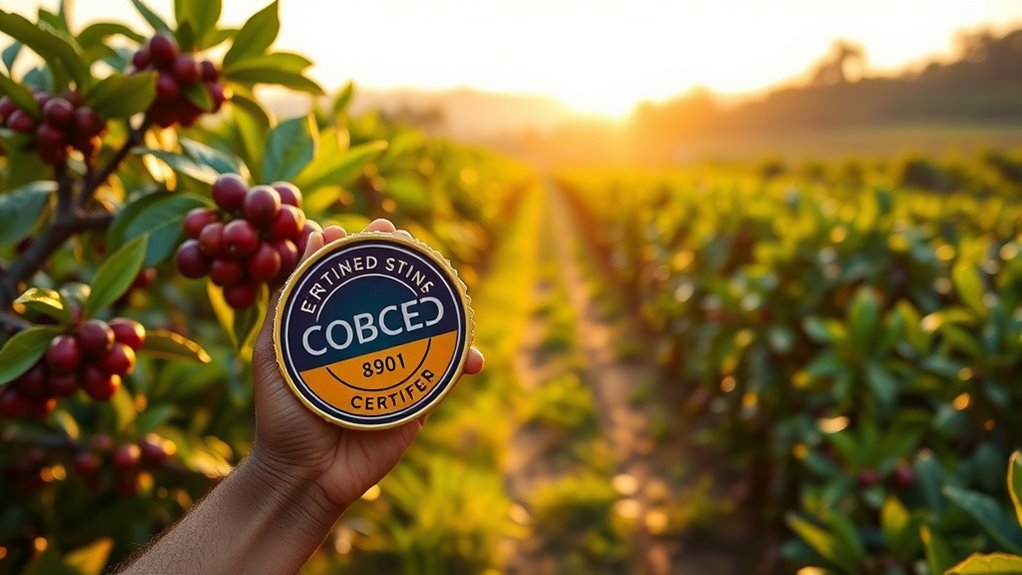Certifications in coffee sourcing play an essential role in promoting ethical practices, fair pricing, and sustainable farming methods. They guarantee that small-scale farmers receive fair wages and invest in their communities. With increasing consumer demand for transparency and organic options, these certifications are becoming more important for brand accountability. You’ll discover how these standards impact your coffee choices and explore the challenges producers face in obtaining them as you continue your exploration.
Key Takeaways
- Certifications ensure fair compensation and ethical practices for coffee farmers, promoting sustainable development within communities.
- They enhance transparency in sourcing, allowing consumers to make informed choices about the coffee they purchase.
- Environmental certifications prioritize biodiversity and sustainable farming, protecting ecosystems while producing coffee.
- The certification process can present challenges for small-scale producers, including high fees and extensive documentation requirements.
- Evolving consumer preferences for certified coffee drive market demand, encouraging brands to adopt ethical sourcing practices.
Overview of Coffee Certifications
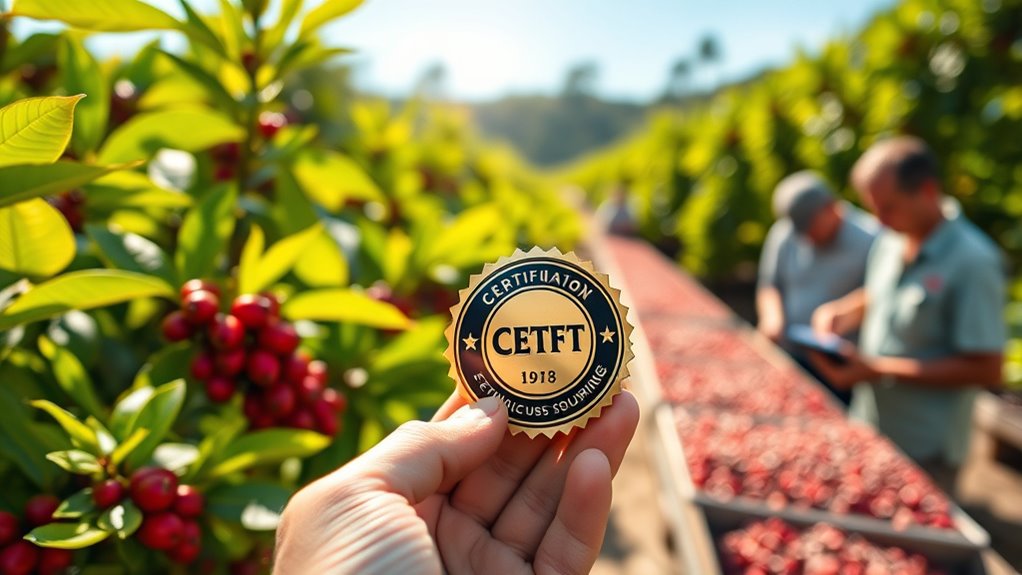
When you’re looking to make ethical choices in your coffee consumption, understanding the various certifications is crucial. Coffee certifications like Fairtrade, Rainforest Alliance, and Organic guide your ethical purchasing decisions.
Fairtrade guarantees small-scale farmers receive fair prices and promotes democratic structures in producer organizations. Rainforest Alliance focuses on biodiversity conservation, enhancing sustainable practices that support both the environment and local communities.
Fairtrade ensures fair pricing for small-scale farmers, while Rainforest Alliance champions biodiversity and sustainable practices for communities and the environment.
Organic certification mandates strict guidelines that prohibit synthetic fertilizers and pesticides, fostering natural farming methods that benefit soil health.
Within the specialty coffee industry, the Specialty Coffee Association offers additional certifications to elevate quality and sustainability.
Fair Trade Certified
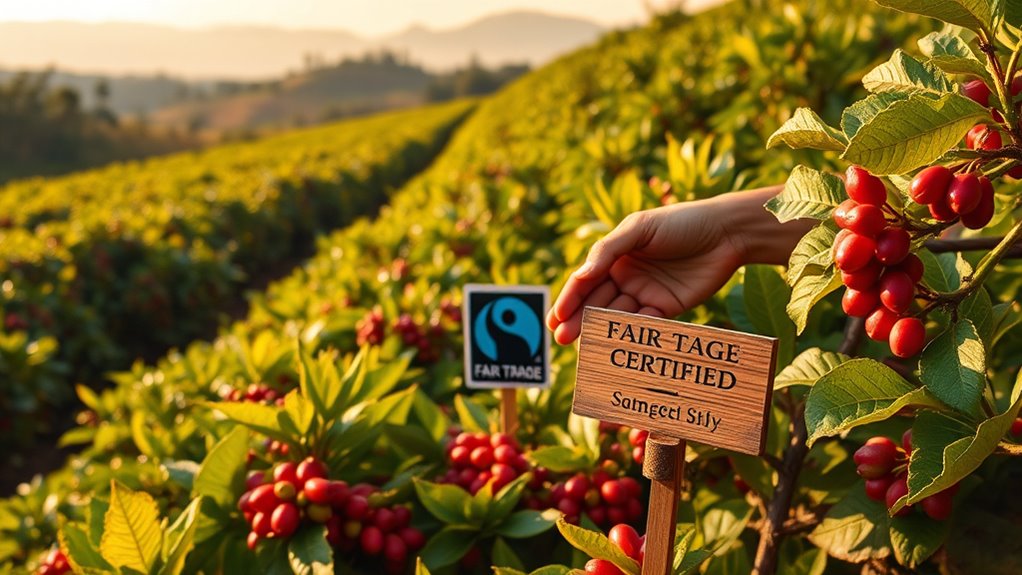
Fair Trade Certified coffee guarantees that small-scale farmers receive fair prices that cover their production costs, while also providing funds for community development projects.
By supporting fair trade practices, you’re helping coffee producers gain a voice through democratic organizations and collective bargaining. This certification program not only guarantees ethical and sustainable practices but also mandates safe working conditions and eco-friendly farming methods.
As a result, the livelihoods of coffee farmers improve, contributing to economic stability in their communities. Since its inception in 1988, Fair Trade has provided a safety net against fluctuating market prices, making it a vital part of sustainable coffee sourcing.
Plus, with consumers increasingly paying a premium for Fair Trade Certified coffee, your choices are positively impacting lives.
Environmental and Sustainable Certifications
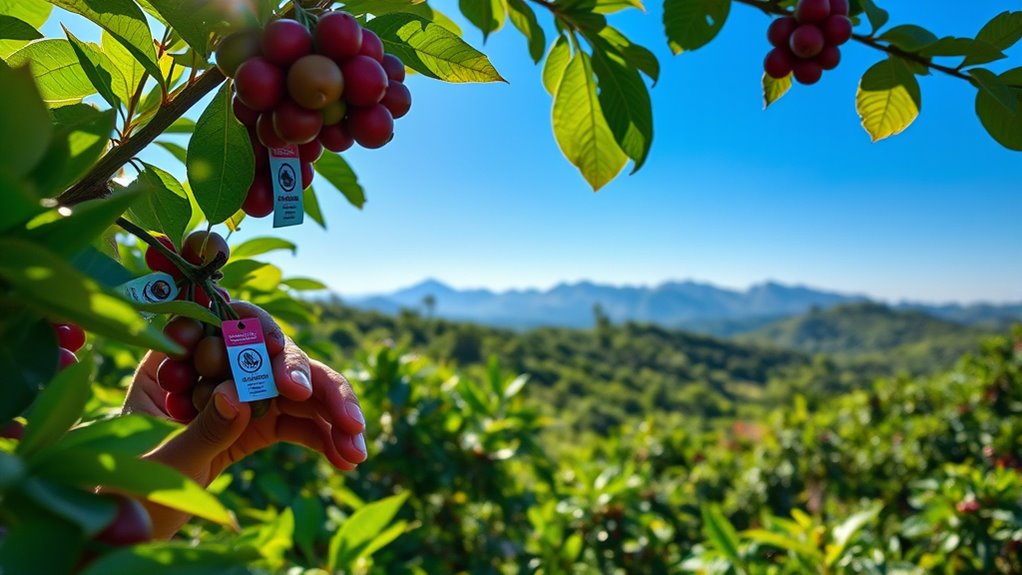
As consumers become more environmentally conscious, understanding environmental and sustainable certifications in coffee sourcing is vital. Certification programs like Rainforest Alliance and USDA Organic focus on environmental standards that promote sustainable practices.
Rainforest Alliance certification guarantees coffee is grown while protecting forests and water resources, supporting social responsibility within communities. Organic certification emphasizes growing coffee without synthetic pesticides, promoting natural farming methods that enhance soil health.
Additionally, certifications like UTZ, which merged with Rainforest Alliance, set rigorous standards for environmental management and provide farmer training.
Shade-grown and Bird-Friendly certifications prioritize forest canopies, important for migratory birds, while encouraging organic practices that support biodiversity.
Specialty Coffee Association (SCA) Certified

Understanding the various certifications in coffee sourcing can enhance your appreciation for the beverage. The Specialty Coffee Association (SCA) Certified program is a key player in promoting sustainable practices and quality within the coffee industry. Through its Coffee Skills Program, it offers training for producers and enthusiasts alike, covering tasting, roasting, brewing, and barista skills. Additionally, the Certified Home Brewer program helps coffee lovers master brewing techniques online.
Here’s a quick look at the SCA certification offerings:
| Certification Type | Focus Area | Target Audience |
|---|---|---|
| Coffee Skills Program | Quality & Skills | Industry Professionals & Enthusiasts |
| Certified Home Brewer | Brewing Techniques | Home Coffee Enthusiasts |
| Coffee Sustainability Program | Environmental Practices | Producers & Supply Chain |
Direct Trade Certified
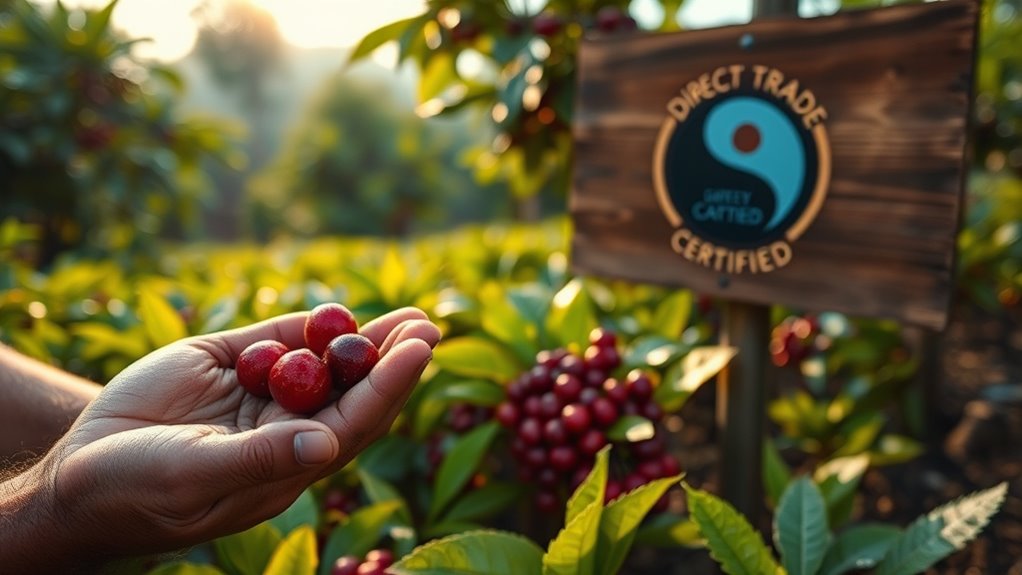
When you choose Direct Trade Certified coffee, you’re supporting a system that values transparency in sourcing and fair pricing practices.
This certification fosters direct relationships between you and the farmers, ensuring they receive proper compensation for their hard work.
Transparency in Sourcing
Transparency in sourcing is essential for building trust between coffee producers and roasters.
With Direct Trade Certified, you foster clear relationships that guarantee fair prices and better working conditions for farmers. This approach emphasizes direct communication, enhancing accountability in the coffee supply chain.
By bypassing intermediaries, you allow producers to share directly in the value of their high-quality products, while also supporting sustainable practices. Not only does this lead to premium prices for coffee, but it also promotes community development projects that uplift the very communities you source from.
Transparency in these sourcing practices aligns with ethical sourcing principles, helping you create a positive impact without relying solely on formal certifications.
Fair Pricing Practices
Because Fair Pricing Practices are at the heart of Direct Trade Certified, you can guarantee that your coffee sourcing aligns with ethical standards.
This certification emphasizes direct relationships between coffee roasters and farmers, ensuring fair pricing that reflects quality.
Here are three key benefits:
- Economic Stability: Direct Trade practices provide farmers with stable incomes, promoting financial security.
- Sustainable Practices: Working directly with small-scale farmers encourages environmentally friendly methods, supporting the community and the planet.
- Transparency: Direct Trade fosters open communication about pricing, allowing consumers to make informed choices about their coffee.
Benefits for Producers
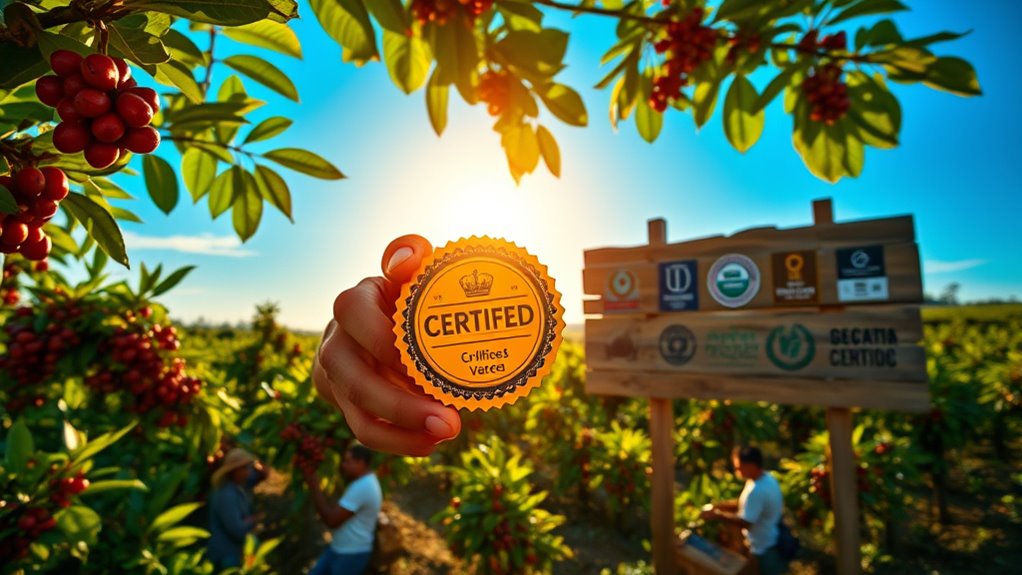
Certifications in coffee sourcing offer producers a pathway to enhance their market presence and profitability. By participating in certification programs, you can showcase your commitment to sustainable practices and social responsibility, setting yourself apart from competitors.
As certified producers, you receive higher prices for your coffee, which can lead to better investments in your farm and improved coffee quality. These organic certifications also bolster your credibility, assuring buyers that your practices meet specific standards.
Additionally, accessing certified markets allows you to establish direct trade relationships with roasters, fostering long-term partnerships and financial stability. While the documentation can be extensive, support systems can help you navigate this process without diverting your focus from farming activities.
The Impact of Certifications on Consumer Choices

With the rise of ethical consumerism, the influence of certifications on your coffee choices is more significant than ever.
These certification programs not only guide your purchasing decisions but also reflect your values. Here are three key impacts:
- Trust in Brands: Certifications like Fair Trade and Rainforest Alliance show a commitment to ethical sourcing and sustainable practices, enhancing your trust in the brand.
- Support for Coffee Farmers: Fair Trade guarantees farmers receive fair wages, motivating you to support brands prioritizing labor practices.
- Informed Choices: Brands displaying USDA Organic logos resonate with 74% of consumers, indicating a preference for quality and sustainability.
Understanding these certification benefits can enable you to make informed consumer choices that align with your ethical beliefs.
Overcoming Challenges in Certification Processes
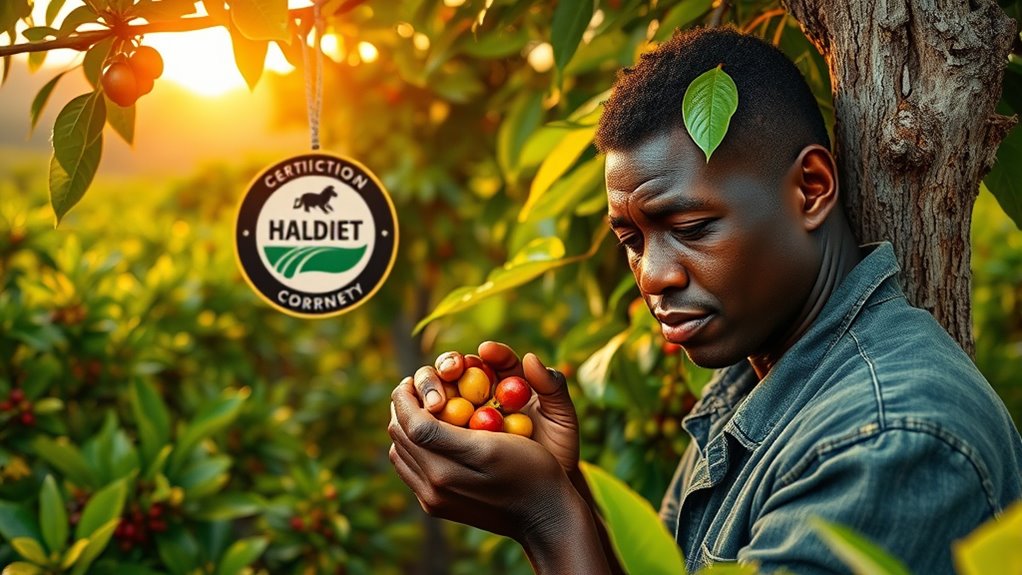
Steering through the certification process can feel overwhelming, especially with the heavy documentation and compliance demands.
You might find that the financial strain adds another layer of difficulty, particularly if you’re a small-scale farmer.
Understanding these challenges is essential as you seek ways to overcome them and maintain your focus on farming.
Documentation and Compliance Burdens
While securing certifications can open doors to new markets, the documentation and compliance burdens often weigh heavily on coffee producers.
Here are some key challenges you might face:
- Extensive Documentation: You’ll need to provide proof of sustainable practices and adherence to environmental, social, and economic standards, which can be overwhelming.
- Regular Audits: Compliance often involves third-party audits and inspections, requiring time and resources that could be spent on farming.
- Financial Strain: Certification fees can strain your limited resources, diverting funds that could support daily operations.
To navigate these hurdles, establishing strong support systems is vital.
These resources can guide you through documentation requirements and help guarantee compliance, allowing you to focus more on your coffee production.
Financial Strain on Producers
As you pursue certification, the financial strain on producers can become a significant hurdle. Certification fees can be a heavy burden, especially for smallholders who often face limited resources. The compliance checks and ongoing audits add to this stress, diverting your focus from farming. However, overcoming these barriers is essential.
| Challenge | Impact on Producers | Potential Benefit |
|---|---|---|
| Certification Fees | High upfront costs | Access to premium markets |
| Compliance Checks | Ongoing financial strain | Maintenance of certified status |
| Certification Application | Resource diversion | Ability to invest in farms |
| Higher Prices | Short-term financial strain | Improved quality of life |
Achieving certified status can lead to higher prices for your coffee, allowing you to invest in your farms and enhance your livelihood.
Support Systems for Producers
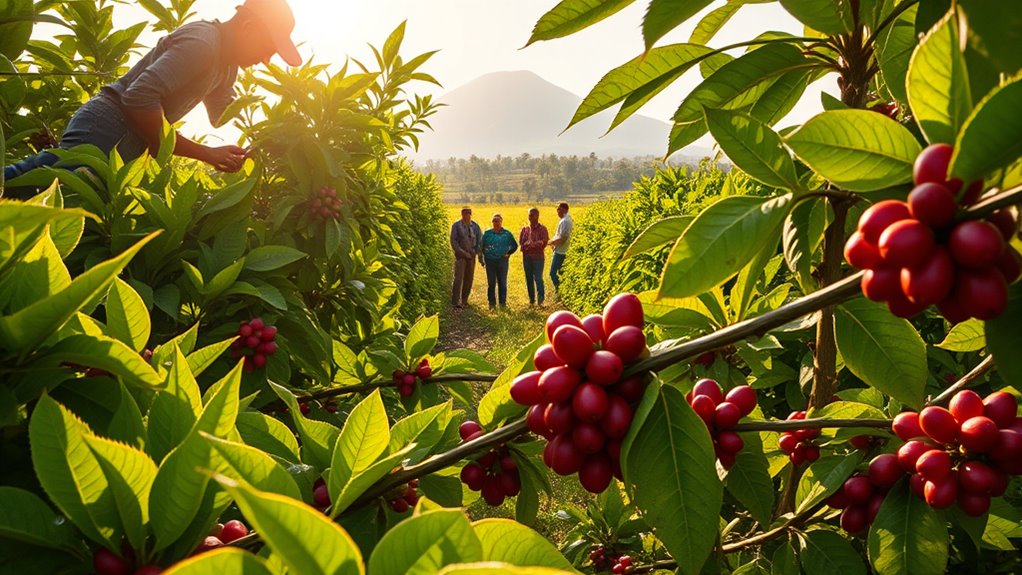
Producers face numerous challenges when pursuing certifications in coffee sourcing, making tailored support systems essential for their success.
These systems provide essential assistance in overcoming financial challenges and ensuring sustainable practices. Here are three key components of effective support systems:
- Training Programs: Access to training on best agricultural practices helps producers improve crop selection, fertilizer application, and coffee drying techniques.
- Agronomic Assistance: Programs like Falcafé’s Neighbors and Friends focus on enhancing productivity and reducing pesticide use, which leads to better quality of life.
- Financial Support: No-cost support programs are critical for smallholder producers, allowing them to implement necessary certifications without incurring additional financial strain.
With these support systems in place, producers can thrive while meeting the rigorous standards of certification programs.
The Future of Coffee Certifications in Marketing
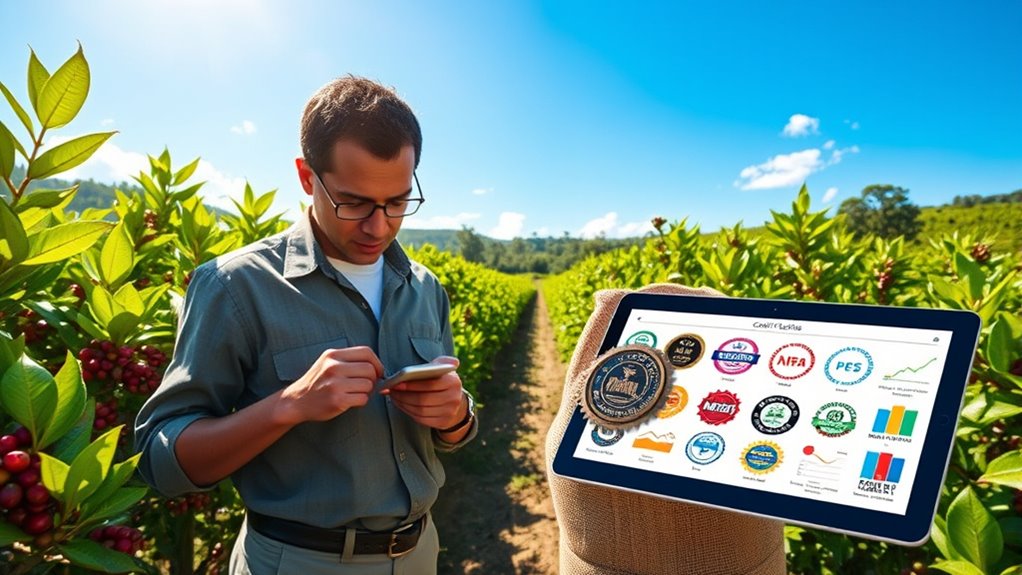
As consumer preferences evolve, you’ll notice a growing emphasis on transparency in coffee sourcing.
Brands that clearly communicate their certification processes will stand out in a crowded market, appealing to ethically-minded buyers.
Enhanced transparency initiatives can help you make informed choices, ensuring that your coffee not only tastes good but also aligns with your values.
Evolving Consumer Preferences
While consumers increasingly prioritize transparency in coffee sourcing, the importance of certifications is more pronounced than ever.
As you navigate the evolving market, consider these key points about consumer preferences:
- Certification Programs: A growing number of consumers seek out organic coffee certification and Fairtrade labels, signaling their commitment to ethical sourcing.
- Willingness to Pay: Research shows that many consumers are willing to pay a premium for certified coffee, enhancing its appeal in specialty coffee markets.
- Sustainable Practices: Brands that highlight sustainable practices resonate with consumers, aligning with their values and fostering loyalty. Additionally, coffee that incorporates adaptogenic properties such as those found in mushroom coffee can further attract health-conscious consumers.
Understanding these trends can help you effectively market your coffee products, ensuring they meet the rising demand for responsible sourcing and transparency.
Enhanced Transparency Initiatives
The demand for transparency in coffee sourcing is reshaping how certifications are marketed. As consumers increasingly seek detailed information about the origin and processing methods of their coffee, certification programs like Fair Trade USA and Rainforest Alliance are stepping up.
These programs not only promote ethical practices but also enforce thorough documentation and audits, enhancing transparency in the supply chain. With a rising interest in sustainable practices, roasters that adopt these certifications can effectively showcase their commitment to environmental and social accountability.
Research shows that consumers are willing to pay a premium for certified coffee, boosting sales and enhancing brand reputation. Future marketing strategies will likely emphasize transparency and ethical practices as key factors influencing purchasing decisions.
Frequently Asked Questions
How Do Coffee Certifications Contribute to Ethical Practices?
Coffee certifications contribute to ethical practices by ensuring farmers receive fair prices while adhering to social and environmental standards.
When you choose certified coffee, you’re supporting producers who prioritize sustainability and community development.
These certifications require ongoing compliance, which means farms maintain high labor and environmental standards.
What Is a Coffee Certification?
A coffee certification is a third-party validation that guarantees specific ethical, environmental, and social standards in coffee production.
When you choose certified coffee, you’re supporting practices that promote fair treatment of farmers, sustainable farming, and environmental protection.
Certifications like Fairtrade and Organic assure that the coffee you’re drinking meets these rigorous criteria.
Which Certification Is Most Commonly Associated With Sustainable Coffee Production?
When you think about sustainable coffee production, the Rainforest Alliance certification often comes to mind.
It focuses on environmental, social, and economic sustainability, promoting biodiversity and fair labor practices. While Fair Trade and Organic certifications also support sustainable practices, Rainforest Alliance is particularly recognized for its thorough approach to conservation.
Do Sustainable Certifications for Coffee Really Help the Coffee Growers?
You might wonder if sustainable certifications genuinely help coffee growers. They do!
These certifications can boost farmers’ incomes by providing access to premium pricing and Fairtrade premiums that fund community projects. While the documentation can be intimidating, the benefits often outweigh the challenges.
As consumers increasingly seek certified coffees, your choice supports growers, allowing them to invest in their farms and communities, ultimately enhancing their livelihoods and ensuring a sustainable future for coffee production.
Conclusion
As you sip your next cup of coffee, consider the journey of those beans. Certifications aren’t just stickers; they represent a commitment to fairness, sustainability, and quality. With each choice you make, you influence the future of coffee sourcing. What if your next decision could change a farmer’s life? As the world of certifications evolves, so does your power as a consumer. Will you take that leap and support a better tomorrow, one cup at a time?
